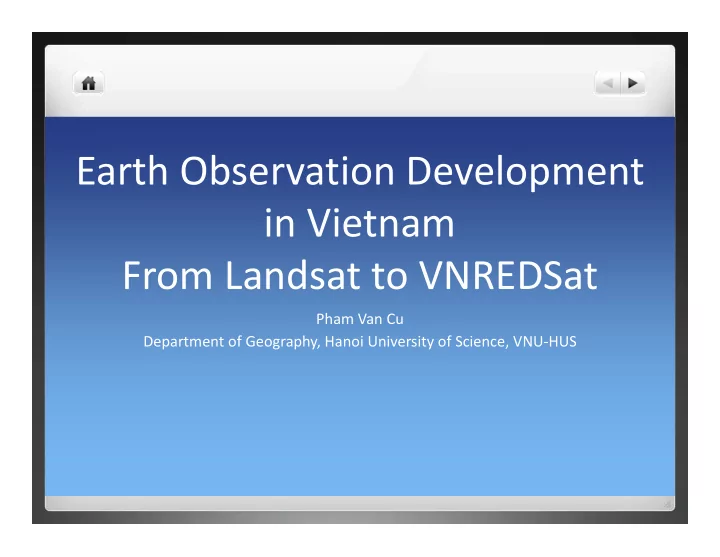

Earth Observation Development in Vietnam From Landsat to VNREDSat Pham Van Cu Department of Geography, Hanoi University of Science, VNU ‐ HUS
Content A historic insight Local Needs and Contribution of Earth Observation Lesson learned from Landsat to VNREDSats
A historic looking back 1979: VAST project with Inter ‐ cosmos program of COMECON Creation of Space Center 1979 Landsat and MKF6 data used 1980’s: First project funded by UNDP and FAO in Forestry Inventory, first Landsat Data used 1980 Vietnamese Astronaut on board of Salyut 6, Project funded by UNDP in VAST, Passive Radar Salinity and Soil Moisture 1984 first project funded by France VAST in 1991 1996 GlobeSAR and Radarsat project in Rice Monitoring in 1999 2000
A historic looking back 2006: Approval of Remote Sensing Master Plan of Vietnam and Installation of Receiving Station in MONRE Establish Space Technology Institute (STI), VAST – 11/2006 2010: Establish Vietnam Space Committee (VSC), GOV – 09/2010 2010: Small Satellite Program 2011: Vietnam National Satellite Centre establishment and Japan Cooperation in Small Satellite fabrication
Local Needs Natural Resources Monitoring Land Use and Land Cover Monitoring Disaster Mapping And Decision Making Support
1000000 1200000 1400000 200000 400000 600000 800000 CROISSANCE DÉMOGRAPHIQUE 0 1918 1926 1928 1936 1939 1942 1954 1960 1969 1976 1978 1979 1980 1981 1982 1983 1984 1985 1986 1987 CONTEXTE 1988 1989 1990 1991 1992 1993 1994 1995 1996 1997
Urbanization Growth (ex. Hanoi) (Pham Van Cu et Al. 2006) 1992 1975 1999 2003
Deforestation Vrs Reforestation • In the mountain provinces of Vietnam, forest is progressively replaced by tea, coffee and mulberry plantations • These plantations do not trap water nor protect soil as well as the forest did before • The frequency of desastrous floods is increasing and erosion accelerates
Rice, Flood of Vietnam in Mekong Basin Large Multinational Monsoon Asia
Natural Disasters in Vietnam River Flooding Flash floods Typhoons Storm Surges Not on map: • Droughts • Salt water intrusion • Forest fire
Food Security and Rice Information Need
What is Earth Observation Contribution since 1980 First and most used is Landsat in forest inventory (early 1980’s) and then Land use Mapping (by 1995) and now SPOT 5 in Forest Inventory Disaster mapping (started Mid 80’s with Landsat and then Radarsat) and forest fire monitoring (started in 90’s with NOAA and now with MODIS) Since 1990’s applications in all economic sectors Remote Sensing Education in Universities and Human Resources
1995 2003
First Fire Detection with NOAA Portable Receiver Test Site is Dien Bien Phu Valley (Jean Paul Malingreau, Jean Marie Gregoire et Al.)
Di ễ n bi ế n cháy t ừ tháng 3/2003 đế n đầ u n ă m 2004
Affter Fire Before Fire
Flood Disaster Mapping (Radarsat) (example of Nov. 1999)
Flood Mapping with Radarsat data 2000 Mekong Delta
RAPID MAP MAKING
21 Oilspill Detection ASAR •V ị trí tàu và v ệ t d ầ u •21 •Ha Noi October 2010
Rice Map of AN Giang Mekong Delta Lam DN And Thuy LT Rice Maps Red River Delta ICARGC 2014 22 7/24/2014
a b Methane emission of rice cultivation on Winter ‐ Spring (a) & Summer ‐ Autumn season Methane emission by province, on (a) season and (b) season Results of Belspo Projetc ICARGC 2013
Important Milestones and Lessons learned •International •Co ‐ •ODA •UN, FAO 1980 1990’s’s 2000‘s 2010’s project solely investment •National •COMECON Investment National Remote Landsat MSS SAR Rice Monitoring Sensing Centre , 2006 National National Department and Flood Mapping and TM and Strategy for for Remote Sensing Land use Forest Space Tech Ground Receiving SPOT 5 Land Use Station inventory Development Space Technology Inventory Institute Small Satellites Aero ‐ photo MODIS Forest Fire National Research interpretation Program Monitoring 26 Years
Earth Observation Education – A Component of Successful Application Started early in 80’s but tardily developed First Satellite Remote Sensing Course in Hanoi University was in 1996 Curriculum adapted Postgraduate and internship mostly in Europe (Netherland, France, Belgium, Germany) and Asia (Japan, AIT and India)
New Instrument Requires New Human Resources and Newer Policy VNREDSat 1
International Cooperation – Key of Succes CSA, ESA, JAXA, NASA And Inter ‐ university Projects, Collaboration with Industry
The Challenges still Remain! High Tech Importation or Development? Application Driven Approach and Spontaneous development Absence of National GIS Infrastructures and Impacts of Added Value Creation Salary and Research Funds and Brain Drain
Thank You for Your Attention
Recommend
More recommend